牛津译林版高中英语选修9Unit 1 Other countries, other cultures Grammar and usage1课件(45张)
文档属性
| 名称 | 牛津译林版高中英语选修9Unit 1 Other countries, other cultures Grammar and usage1课件(45张) |
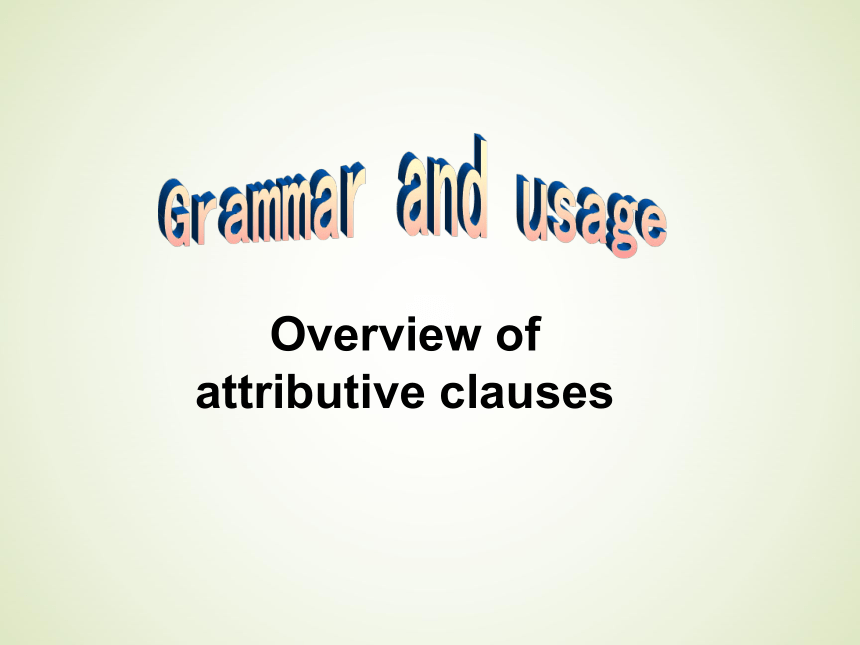
|
|
| 格式 | zip | ||
| 文件大小 | 260.6KB | ||
| 资源类型 | 教案 | ||
| 版本资源 | 牛津译林版 | ||
| 科目 | 英语 | ||
| 更新时间 | 2019-03-15 00:00:00 | ||
图片预览


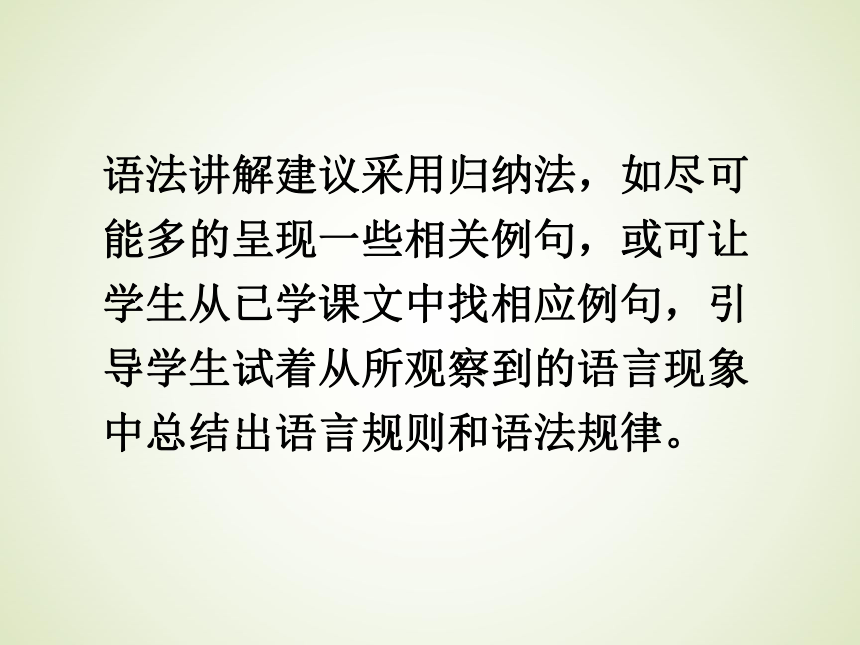
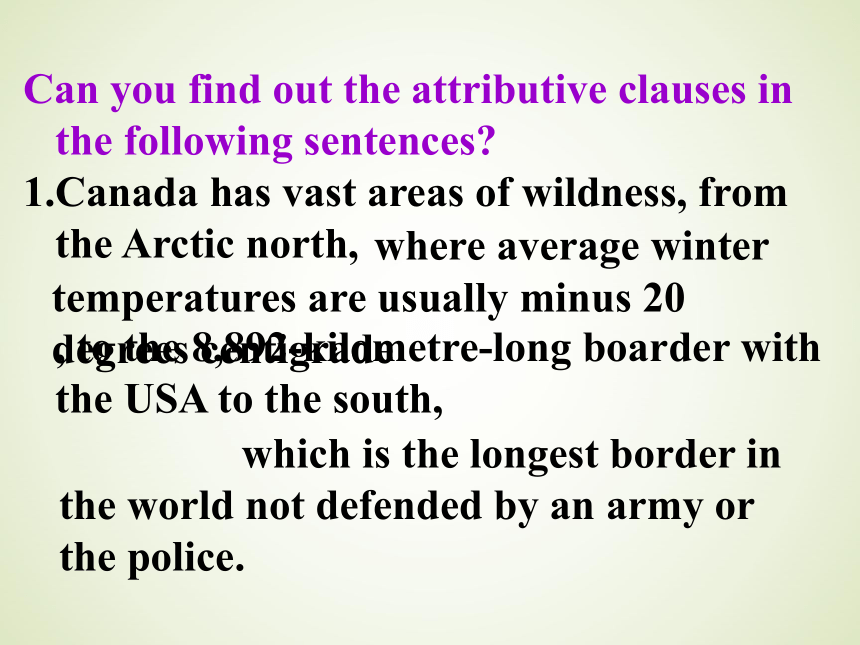
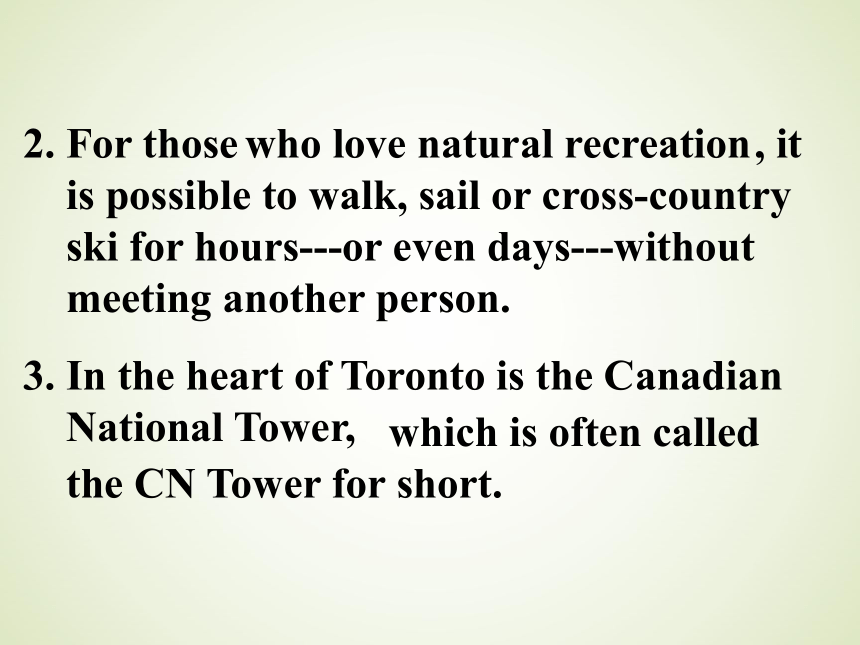
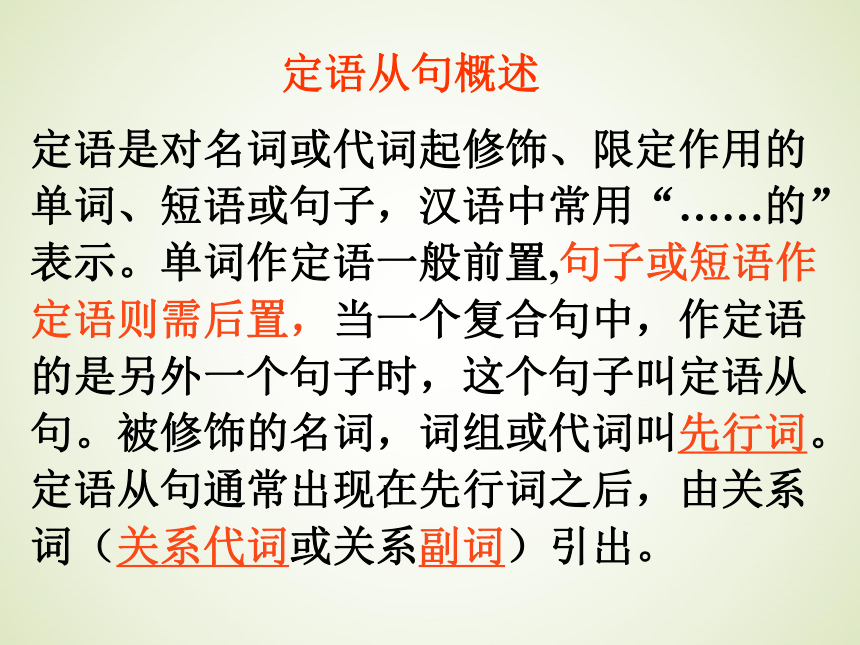
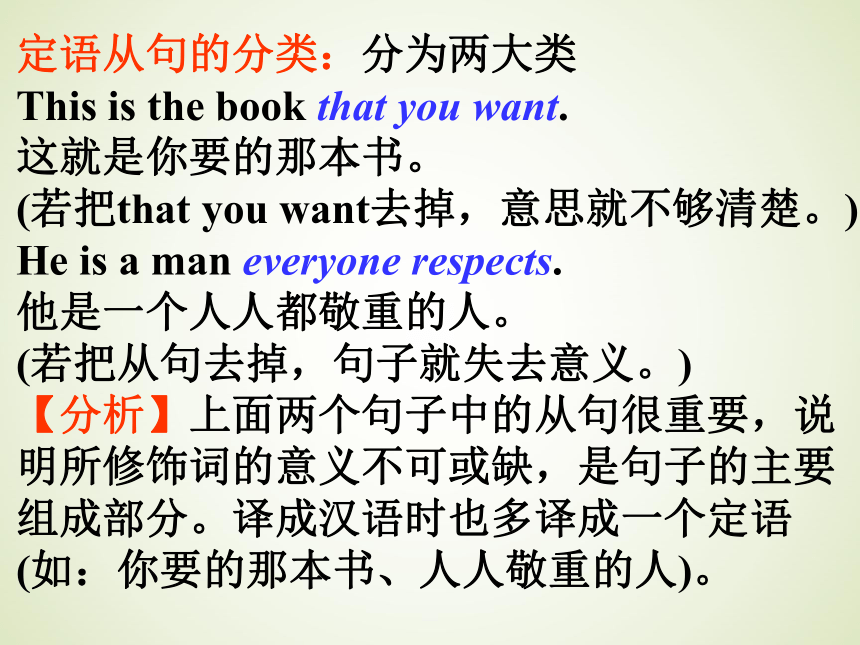
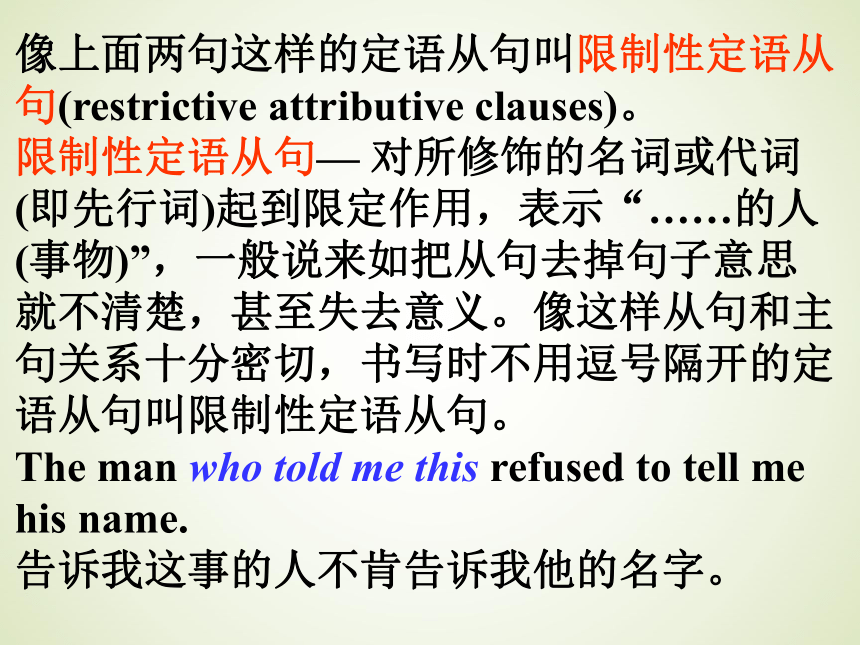
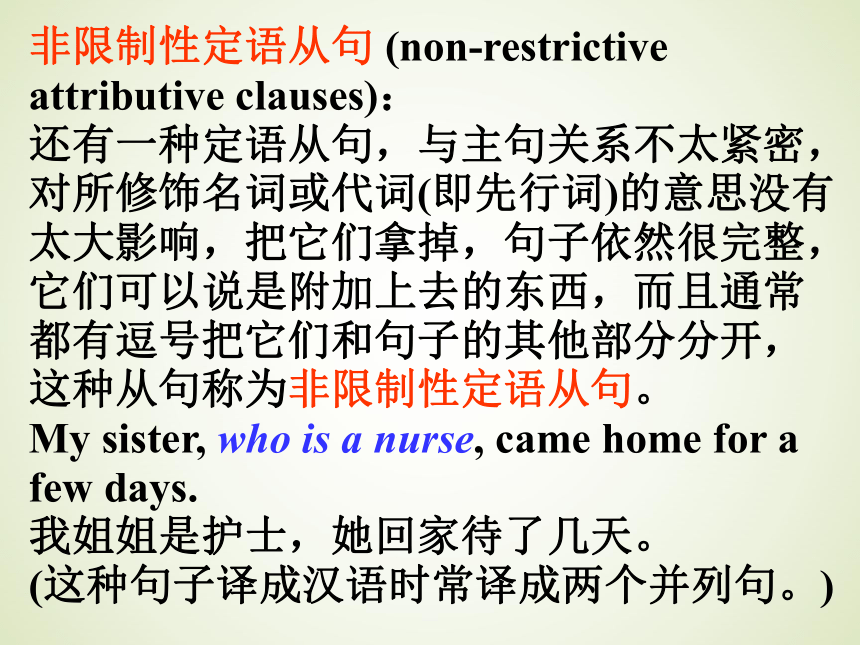
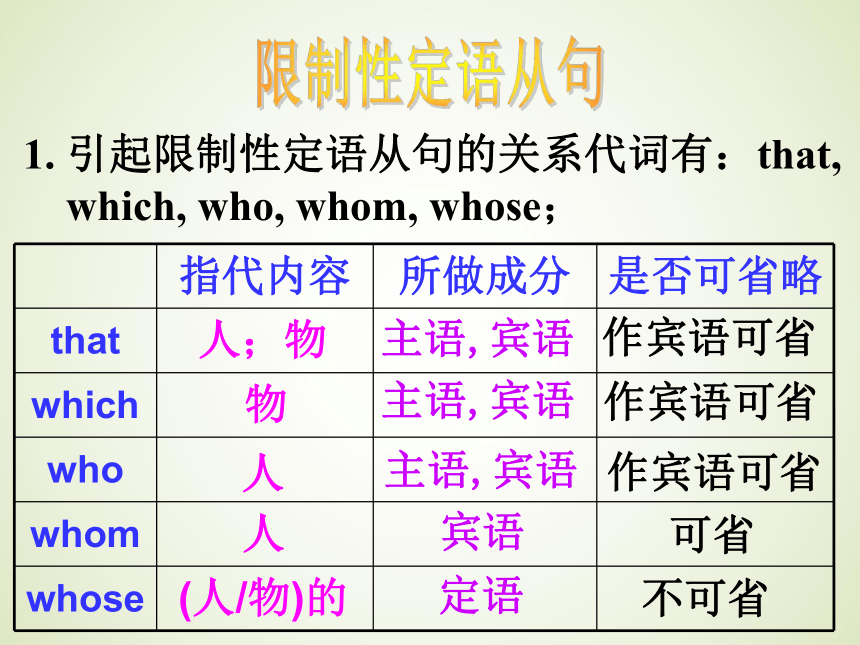
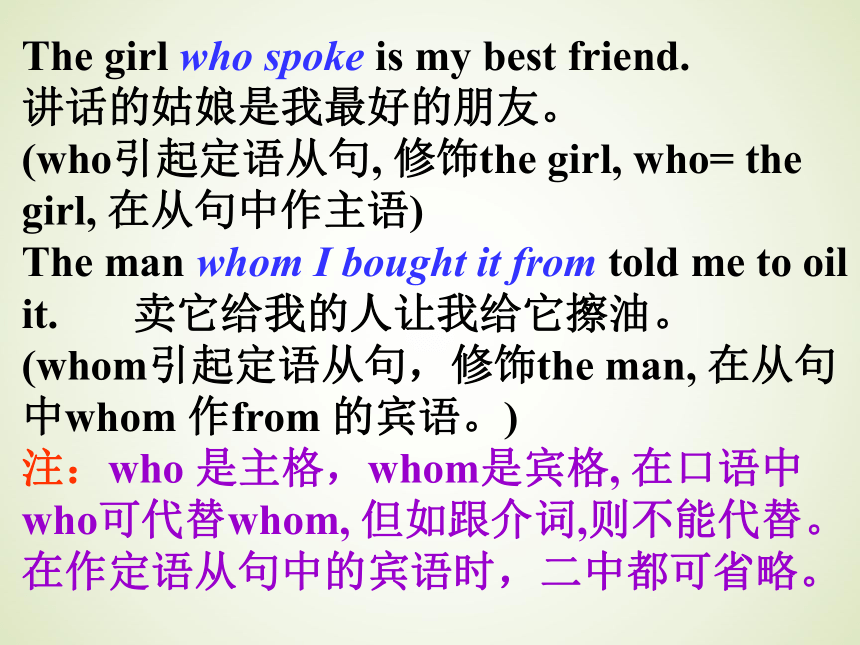
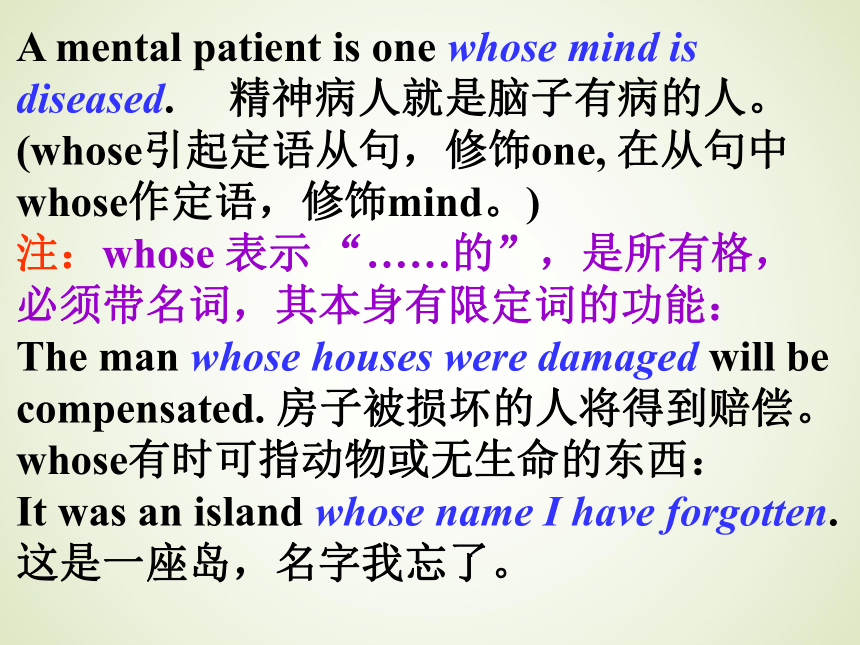
文档简介
课件45张PPT。Grammar and usageOverview of
attributive clausesObjectivesTo review attributive clauses
To learn the differences between the two types of attributive clauses
To learn how relative pronouns and adverbs are used in attributive clauses语法讲解建议采用归纳法,如尽可能多的呈现一些相关例句,或可让学生从已学课文中找相应例句,引导学生试着从所观察到的语言现象中总结出语言规则和语法规律。Can you find out the attributive clauses in the following sentences?
Canada has vast areas of wildness, from
the Arctic north,
, to the 8,892-kilometre-long boarder with the USA to the south,
where average winter temperatures are usually minus 20 degrees centigrade which is the longest border in the world not defended by an army or the police.2. For those , it
is possible to walk, sail or cross-country
ski for hours---or even days---without
meeting another person.
3. In the heart of Toronto is the Canadian
National Tower, who love natural recreation which is often called the CN Tower for short.定语是对名词或代词起修饰、限定作用的单词、短语或句子,汉语中常用“……的”表示。单词作定语一般前置,句子或短语作定语则需后置,当一个复合句中,作定语的是另外一个句子时,这个句子叫定语从句。被修饰的名词,词组或代词叫先行词。定语从句通常出现在先行词之后,由关系词(关系代词或关系副词)引出。定语从句概述定语从句的分类:分为两大类
This is the book that you want.
这就是你要的那本书。
(若把that you want去掉,意思就不够清楚。)
He is a man everyone respects.
他是一个人人都敬重的人。
(若把从句去掉,句子就失去意义。)
【分析】上面两个句子中的从句很重要,说明所修饰词的意义不可或缺,是句子的主要组成部分。译成汉语时也多译成一个定语(如:你要的那本书、人人敬重的人)。像上面两句这样的定语从句叫限制性定语从句(restrictive attributive clauses)。
限制性定语从句— 对所修饰的名词或代词(即先行词)起到限定作用,表示“……的人(事物)”,一般说来如把从句去掉句子意思就不清楚,甚至失去意义。像这样从句和主句关系十分密切,书写时不用逗号隔开的定语从句叫限制性定语从句。
The man who told me this refused to tell me his name.
告诉我这事的人不肯告诉我他的名字。非限制性定语从句 (non-restrictive attributive clauses):
还有一种定语从句,与主句关系不太紧密,对所修饰名词或代词(即先行词)的意思没有太大影响,把它们拿掉,句子依然很完整,它们可以说是附加上去的东西,而且通常都有逗号把它们和句子的其他部分分开,这种从句称为非限制性定语从句。
My sister, who is a nurse, came home for a few days.
我姐姐是护士,她回家待了几天。
(这种句子译成汉语时常译成两个并列句。)限制性定语从句1. 引起限制性定语从句的关系代词有:that,
which, who, whom, whose;人;物物人人(人/物)的主语,宾语主语,宾语主语,宾语宾语定语作宾语可省作宾语可省作宾语可省可省不可省The girl who spoke is my best friend.
讲话的姑娘是我最好的朋友。
(who引起定语从句, 修饰the girl, who= the girl, 在从句中作主语)
The man whom I bought it from told me to oil it. 卖它给我的人让我给它擦油。
(whom引起定语从句,修饰the man, 在从句中whom 作from 的宾语。)
注:who 是主格,whom是宾格, 在口语中who可代替whom, 但如跟介词,则不能代替。
在作定语从句中的宾语时,二中都可省略。A mental patient is one whose mind is diseased. 精神病人就是脑子有病的人。
(whose引起定语从句,修饰one, 在从句中whose作定语,修饰mind。)
注:whose 表示 “……的”,是所有格,必须带名词,其本身有限定词的功能:
The man whose houses were damaged will be compensated. 房子被损坏的人将得到赔偿。
whose有时可指动物或无生命的东西:
It was an island whose name I have forgotten. 这是一座岛,名字我忘了。He that would eat the fruit must climb the tree. 想吃果子的人就得爬树。
(that引起定语从句,修饰he, 在从句中that作主语,代表he。)
注:that可以代表人(相当于who),也可代表东西(相当于which);可以作主语,也可作宾语(可省)。
It is a question that needs very careful thinking. 这是一个需要仔细思考的问题。
Those books (that) you lent me were very useful. 你借给我的那些书很有用。She was not in the train which arrived just now. 她不在刚到的那列火车上。
(which引起定语从句,修饰the train, 在从句中which 作主语,代表the train。)
注:which只能代表东西或动物,可作主语和宾语,宾语时可省。
That is the house (which) we built.
这就是我们盖得房子。
which还可在句中作介词的宾语:
The documents for which they were searching have been recovered.
他们寻找的文件已经找到了。2. 限制性定语从句还可以由关系副词where,
when, why 引起。不可省略时间地点原因状语状语状语when 在定语从句中作时间状语,先行词往往是表示时间的名词。相当于介词+which。
I’ll never forget the day when (=on which) I joined the League.
我永远也不会忘记我加入团的那一天。
1993 was the year when (=in which) he was born.
1993年是他的出生年。
There are times when such things are necessary. 有时候这样的事情是必要的。where在定语从句中作地点状语,先行词是表示地点的名词。相当于 “介词 + which”。
This is the house where (=in which) I lived two years ago.这就是我两年前住过的地方。
That’s the hotel where we were staying last summer. 这就是我们去年夏天住的旅馆。where引导的定语从句也可以修饰case, condition, situation, instance等先行词。
Can you think of a situation where this word can be used?why在定语从句中作原因状语,相当于
for which。
Do you know the reason why (=for which) she is late? 你知道她迟到的原因吗?
She didn’t tell me the reason why she refused the offer.
她没跟我讲她拒绝这项工作的原因。
Give me one reason why we should help you.
给我举出一个我们应该帮你的理由。
注:如果关系代词指代先行词reason在从句中作主语,宾语等时,则用that或which。非限制性定语从句 能引起非限制性定语从句的关系代词主要
有: who, whom, whose, which
I’ve invited Lisa, who lives in the next flat.
我邀请了丽莎,她住在我们隔壁。
Tom, whom everyone suspected, turned out to
be innocent.
人人都怀疑汤姆,结果证明他是无辜的。
Mr. Green, for whom I was working, was very
generous. 我给格林先生工作,他很大方。The visitor, whose name was Tom, was well pleased with the apartment.
那位来访的人名字叫汤姆,他很喜欢这套住房。
She gave me this sweater, which she had knitted herself.
她给我这件毛衣,这是她自己织的。
The 8:30 train, which is usually very punctual, was late today.
八点半的火车通常是很准时的,今天却晚点了。注: (1) which, whom可以和 “of” 或其他介词连用:
The buses, most of which were already full, were surrounded by an angry crowd.
Her sons, both of whom work abroad, rang her up this morning.
His house, for which he paid $10,000, is now worth $50,000.
George, with whom I played tennis on Sundays, was fitter than me.(2) which 有时不代表一个名词,而代表前面句子的全部或部分意思:
Peter drove too fast, which was dangerous.
彼得开车很快,这是很危险的。
He said that he had never seen her before, which was not true.
他说他从来没见过她,这是不真实的。
(3) which 有时还可在从句中作定语:
He advised me to hide behind the door, which advice I took at once.
他劝我躲在门后,我立即照做了。2. 关系副词 when 和 where也可引起非限制
性定语从句。
We’ll put off the picnic until next week, when the weather may be better. 我们将把野餐推迟到下周,那时天气可能会好点。
That was in 1949, since when things have been better.
那时是1949年,从那以后情况就好些了。
I’m off to the park, where I have to give a lecture on the theatre. 我要去公园,在那里我的做一个关于戏剧的报告。
We went up to the roof, from where we had a good view of the city.
我们爬上屋顶,从那儿可以很好地观看城市。as引起的定语从句as也可作关系代词,引起定语从句,主要和such连用:
He is not such a fool as he looks.
他不像他看起来那么傻。
I never heard such stories as he tells.
我从未听过他讲的这种故事。
We had hoped to give you a chance such as nobody else ever had.
我们本希望给你一个别人从未有过的机会。as作关系代词,还可以和same连用:
You must show my wife the same respect as you show me.
你必须对我妻子表现出与对我同样的尊敬。
My stand on this is just the same as it was four years ago.
我对这问题的立场仍和四年前一样。
She knew he felt just the same as she did.
她知道他的感受和她一样。as有时候还可引起非限制性定语从句:
Sophia was not unconscious, as could be judged from her eyes.
索菲亚未失去知觉,这从她的眼睛里可以看出来。
He is absent, as is often the case.
他缺席了,他经常这样。
Michael, as might be expected, was attending the conference.
迈克在参加会议,这是可以预料到的。that和which的一些特殊用法 (1) 限制性定语从句中先行词为all, everything, anything, nothing, none, few, little, some等不定代词指物时。(something用that或which均可)
Have you taken down everything that Mr. Li said??
There seems to be nothing that is impossible to him in the world.?一般用that而不用which的情况。(2) There be 句型中用that。
There?is?a?book?on?the?desk?that?belongs?to?Tom.
(3) 先行词被序数词或最高级修饰。
This is the first book (that) he has read.
This is the best film (that) I have ever seen.
This is the first time (that) I am in Beijing.(4) 先行词是who或which引导的主句。
Who is the girl that drove the car?
Who that broke the window will be punished?
Which is the T-shirt that fits me most?
Who is the man that is reading the newspaper over there? (5) 当先行词既有人又有物。
They talked about the persons and things that they remembered at school.
Look at the man and his donkey that are walking up the street.
(6) 先行词被all, every, no, some, any, little, much, the only, the very, the last, just, right等修饰。
I’ve read all the books that are not mine.
This is the very book that belongs to him.(1) 紧跟介词作宾语
There are many trees under which they can have a rest.
(2) 在非限制性定语从句中
Football, which is a very popular game, is played all over the world.
(3) 作定语
He may be late, in which case, we should wait for him.一般用which而不用that的情况。 Join the sentences using
attributive clauses.课本练习 Niagara Falls, which is in the south-
eastern part of Canada, is 670 metres
wide.
2. I didn’t understand the reason why Mary wanted to leave her home town.
3. Teresa, whose sister is my friend, is good at all her subject.4. Quebec, where most people speak French, has a large population.
5. John is one of the many students who/that want to travel around the world.
6. High school is a good time when we learn to give serious thought to our future.
7. As is known to all, Canada is one of the largest countries in the world.B. Choose a proper attributive
clause to fill in each blank.课本练习In my school we hold three festivals every year: the Arts Festival, the Science Festival and the Sports Festival.
The Arts Festival starts in early February, ____________________________________
________. During the Arts Festival season, which lasts about a month, we hold various activities. Those _____________________ take part in the Top-10 Singers Competition.when students come back from the winter holidayswho are gifted in singingThere is also the Gold Voice Competition, in which students give oral presentations on certain topics and compete for the Best Speaker Award. Then we have exhibitions of students’ works of art, including photos, drawings and paintings. The most exciting part of this festival is the Merry Show,
____________________________________
_______________________.
The Science Festival in May attracts the students from the very beginning with itswhere students and teachers give all sorts of performances on stageopening ceremony. That is an occasion when model planes and model rockets are flown over the school grounds. Activities of the Science Festival include the Inventions Show, _______________________________
__________, and also the Science Essay Competition. in which students exhibit their
inventionsThe Sports Festivals usually takes place in October. Besides track and field competitions, we also have basketball and football matches, which require good teamwork, _________________.
These three festivals play an important role in our school life. They appeal to us students because we can all have fun and benefit a lot from them.as you can imagine单项选择
____ is known to the world, China’s Liu
Xiang became the first Asian in history to
win the men’s 110m hurdles at the
Olympic Games.
A. That B. Which
C. As D. It
2. I don’t know the reason ______ you were absent from the meeting, but I am sure that someone will tell me the reason ______ you haven’t told me.
A. why; that B. that; why
C. because; which D. of which; that 3. When she came back from abroad, Lucy
told us about the cities and the people
______ she had visited.
A. that B. who
C. where D. which
4. There are three things ______ make
Sydney famous, its beautiful harbor, the
Sydney Harbor Bridge and the Sydney
Opera House.
A. what B. that
C. when D. where 5. There is a teapot shaped like a Chinese
duck, out of ______ mouth tea is
supposed to come.
A. which B. that
C. its D. whose
6. The humans are destroying nature day
by day, ______ of course, will cause
severe punishment from it sooner or
later.
A. who B. when
C. where D. which 7. —I got an email from Susan, ______ said
she was going abroad for sightseeing.
—Fantastic! That’s what she has been
dreaming of.
A. which B. she
C. who D. it
8. After graduation from high school we
will reach a point ______ we have to
decide which university to attend.
A. that B. what
C. which D. where9. Cathy was a teacher from Newcastle,
______ is almost as far north as you can
go.
A. who B. which
C. that D. where
10. In our ______, anyone ______ breaks
the law should be punished.
A. opinions; that B. opinions; who
C. opinion; he D. opinion; who11. Life is like a long race ______ we
compete with others to go beyond
ourselves.
A. why B. what
C. that D. where
12. The girl in plain clothes, ______ was
wonderfully calm in face of danger,
was just sixteen years old.
A. when B. which
C. what D. who PreviewTo preview Task about planning a trip:
Skills building 1: inferring information
Skills building 2: asking for repetition of
information
Skills building 3: writing a travel planHomework Read the points on Page 8 again.
Do the exercises on Page 100.
attributive clausesObjectivesTo review attributive clauses
To learn the differences between the two types of attributive clauses
To learn how relative pronouns and adverbs are used in attributive clauses语法讲解建议采用归纳法,如尽可能多的呈现一些相关例句,或可让学生从已学课文中找相应例句,引导学生试着从所观察到的语言现象中总结出语言规则和语法规律。Can you find out the attributive clauses in the following sentences?
Canada has vast areas of wildness, from
the Arctic north,
, to the 8,892-kilometre-long boarder with the USA to the south,
where average winter temperatures are usually minus 20 degrees centigrade which is the longest border in the world not defended by an army or the police.2. For those , it
is possible to walk, sail or cross-country
ski for hours---or even days---without
meeting another person.
3. In the heart of Toronto is the Canadian
National Tower, who love natural recreation which is often called the CN Tower for short.定语是对名词或代词起修饰、限定作用的单词、短语或句子,汉语中常用“……的”表示。单词作定语一般前置,句子或短语作定语则需后置,当一个复合句中,作定语的是另外一个句子时,这个句子叫定语从句。被修饰的名词,词组或代词叫先行词。定语从句通常出现在先行词之后,由关系词(关系代词或关系副词)引出。定语从句概述定语从句的分类:分为两大类
This is the book that you want.
这就是你要的那本书。
(若把that you want去掉,意思就不够清楚。)
He is a man everyone respects.
他是一个人人都敬重的人。
(若把从句去掉,句子就失去意义。)
【分析】上面两个句子中的从句很重要,说明所修饰词的意义不可或缺,是句子的主要组成部分。译成汉语时也多译成一个定语(如:你要的那本书、人人敬重的人)。像上面两句这样的定语从句叫限制性定语从句(restrictive attributive clauses)。
限制性定语从句— 对所修饰的名词或代词(即先行词)起到限定作用,表示“……的人(事物)”,一般说来如把从句去掉句子意思就不清楚,甚至失去意义。像这样从句和主句关系十分密切,书写时不用逗号隔开的定语从句叫限制性定语从句。
The man who told me this refused to tell me his name.
告诉我这事的人不肯告诉我他的名字。非限制性定语从句 (non-restrictive attributive clauses):
还有一种定语从句,与主句关系不太紧密,对所修饰名词或代词(即先行词)的意思没有太大影响,把它们拿掉,句子依然很完整,它们可以说是附加上去的东西,而且通常都有逗号把它们和句子的其他部分分开,这种从句称为非限制性定语从句。
My sister, who is a nurse, came home for a few days.
我姐姐是护士,她回家待了几天。
(这种句子译成汉语时常译成两个并列句。)限制性定语从句1. 引起限制性定语从句的关系代词有:that,
which, who, whom, whose;人;物物人人(人/物)的主语,宾语主语,宾语主语,宾语宾语定语作宾语可省作宾语可省作宾语可省可省不可省The girl who spoke is my best friend.
讲话的姑娘是我最好的朋友。
(who引起定语从句, 修饰the girl, who= the girl, 在从句中作主语)
The man whom I bought it from told me to oil it. 卖它给我的人让我给它擦油。
(whom引起定语从句,修饰the man, 在从句中whom 作from 的宾语。)
注:who 是主格,whom是宾格, 在口语中who可代替whom, 但如跟介词,则不能代替。
在作定语从句中的宾语时,二中都可省略。A mental patient is one whose mind is diseased. 精神病人就是脑子有病的人。
(whose引起定语从句,修饰one, 在从句中whose作定语,修饰mind。)
注:whose 表示 “……的”,是所有格,必须带名词,其本身有限定词的功能:
The man whose houses were damaged will be compensated. 房子被损坏的人将得到赔偿。
whose有时可指动物或无生命的东西:
It was an island whose name I have forgotten. 这是一座岛,名字我忘了。He that would eat the fruit must climb the tree. 想吃果子的人就得爬树。
(that引起定语从句,修饰he, 在从句中that作主语,代表he。)
注:that可以代表人(相当于who),也可代表东西(相当于which);可以作主语,也可作宾语(可省)。
It is a question that needs very careful thinking. 这是一个需要仔细思考的问题。
Those books (that) you lent me were very useful. 你借给我的那些书很有用。She was not in the train which arrived just now. 她不在刚到的那列火车上。
(which引起定语从句,修饰the train, 在从句中which 作主语,代表the train。)
注:which只能代表东西或动物,可作主语和宾语,宾语时可省。
That is the house (which) we built.
这就是我们盖得房子。
which还可在句中作介词的宾语:
The documents for which they were searching have been recovered.
他们寻找的文件已经找到了。2. 限制性定语从句还可以由关系副词where,
when, why 引起。不可省略时间地点原因状语状语状语when 在定语从句中作时间状语,先行词往往是表示时间的名词。相当于介词+which。
I’ll never forget the day when (=on which) I joined the League.
我永远也不会忘记我加入团的那一天。
1993 was the year when (=in which) he was born.
1993年是他的出生年。
There are times when such things are necessary. 有时候这样的事情是必要的。where在定语从句中作地点状语,先行词是表示地点的名词。相当于 “介词 + which”。
This is the house where (=in which) I lived two years ago.这就是我两年前住过的地方。
That’s the hotel where we were staying last summer. 这就是我们去年夏天住的旅馆。where引导的定语从句也可以修饰case, condition, situation, instance等先行词。
Can you think of a situation where this word can be used?why在定语从句中作原因状语,相当于
for which。
Do you know the reason why (=for which) she is late? 你知道她迟到的原因吗?
She didn’t tell me the reason why she refused the offer.
她没跟我讲她拒绝这项工作的原因。
Give me one reason why we should help you.
给我举出一个我们应该帮你的理由。
注:如果关系代词指代先行词reason在从句中作主语,宾语等时,则用that或which。非限制性定语从句 能引起非限制性定语从句的关系代词主要
有: who, whom, whose, which
I’ve invited Lisa, who lives in the next flat.
我邀请了丽莎,她住在我们隔壁。
Tom, whom everyone suspected, turned out to
be innocent.
人人都怀疑汤姆,结果证明他是无辜的。
Mr. Green, for whom I was working, was very
generous. 我给格林先生工作,他很大方。The visitor, whose name was Tom, was well pleased with the apartment.
那位来访的人名字叫汤姆,他很喜欢这套住房。
She gave me this sweater, which she had knitted herself.
她给我这件毛衣,这是她自己织的。
The 8:30 train, which is usually very punctual, was late today.
八点半的火车通常是很准时的,今天却晚点了。注: (1) which, whom可以和 “of” 或其他介词连用:
The buses, most of which were already full, were surrounded by an angry crowd.
Her sons, both of whom work abroad, rang her up this morning.
His house, for which he paid $10,000, is now worth $50,000.
George, with whom I played tennis on Sundays, was fitter than me.(2) which 有时不代表一个名词,而代表前面句子的全部或部分意思:
Peter drove too fast, which was dangerous.
彼得开车很快,这是很危险的。
He said that he had never seen her before, which was not true.
他说他从来没见过她,这是不真实的。
(3) which 有时还可在从句中作定语:
He advised me to hide behind the door, which advice I took at once.
他劝我躲在门后,我立即照做了。2. 关系副词 when 和 where也可引起非限制
性定语从句。
We’ll put off the picnic until next week, when the weather may be better. 我们将把野餐推迟到下周,那时天气可能会好点。
That was in 1949, since when things have been better.
那时是1949年,从那以后情况就好些了。
I’m off to the park, where I have to give a lecture on the theatre. 我要去公园,在那里我的做一个关于戏剧的报告。
We went up to the roof, from where we had a good view of the city.
我们爬上屋顶,从那儿可以很好地观看城市。as引起的定语从句as也可作关系代词,引起定语从句,主要和such连用:
He is not such a fool as he looks.
他不像他看起来那么傻。
I never heard such stories as he tells.
我从未听过他讲的这种故事。
We had hoped to give you a chance such as nobody else ever had.
我们本希望给你一个别人从未有过的机会。as作关系代词,还可以和same连用:
You must show my wife the same respect as you show me.
你必须对我妻子表现出与对我同样的尊敬。
My stand on this is just the same as it was four years ago.
我对这问题的立场仍和四年前一样。
She knew he felt just the same as she did.
她知道他的感受和她一样。as有时候还可引起非限制性定语从句:
Sophia was not unconscious, as could be judged from her eyes.
索菲亚未失去知觉,这从她的眼睛里可以看出来。
He is absent, as is often the case.
他缺席了,他经常这样。
Michael, as might be expected, was attending the conference.
迈克在参加会议,这是可以预料到的。that和which的一些特殊用法 (1) 限制性定语从句中先行词为all, everything, anything, nothing, none, few, little, some等不定代词指物时。(something用that或which均可)
Have you taken down everything that Mr. Li said??
There seems to be nothing that is impossible to him in the world.?一般用that而不用which的情况。(2) There be 句型中用that。
There?is?a?book?on?the?desk?that?belongs?to?Tom.
(3) 先行词被序数词或最高级修饰。
This is the first book (that) he has read.
This is the best film (that) I have ever seen.
This is the first time (that) I am in Beijing.(4) 先行词是who或which引导的主句。
Who is the girl that drove the car?
Who that broke the window will be punished?
Which is the T-shirt that fits me most?
Who is the man that is reading the newspaper over there? (5) 当先行词既有人又有物。
They talked about the persons and things that they remembered at school.
Look at the man and his donkey that are walking up the street.
(6) 先行词被all, every, no, some, any, little, much, the only, the very, the last, just, right等修饰。
I’ve read all the books that are not mine.
This is the very book that belongs to him.(1) 紧跟介词作宾语
There are many trees under which they can have a rest.
(2) 在非限制性定语从句中
Football, which is a very popular game, is played all over the world.
(3) 作定语
He may be late, in which case, we should wait for him.一般用which而不用that的情况。 Join the sentences using
attributive clauses.课本练习 Niagara Falls, which is in the south-
eastern part of Canada, is 670 metres
wide.
2. I didn’t understand the reason why Mary wanted to leave her home town.
3. Teresa, whose sister is my friend, is good at all her subject.4. Quebec, where most people speak French, has a large population.
5. John is one of the many students who/that want to travel around the world.
6. High school is a good time when we learn to give serious thought to our future.
7. As is known to all, Canada is one of the largest countries in the world.B. Choose a proper attributive
clause to fill in each blank.课本练习In my school we hold three festivals every year: the Arts Festival, the Science Festival and the Sports Festival.
The Arts Festival starts in early February, ____________________________________
________. During the Arts Festival season, which lasts about a month, we hold various activities. Those _____________________ take part in the Top-10 Singers Competition.when students come back from the winter holidayswho are gifted in singingThere is also the Gold Voice Competition, in which students give oral presentations on certain topics and compete for the Best Speaker Award. Then we have exhibitions of students’ works of art, including photos, drawings and paintings. The most exciting part of this festival is the Merry Show,
____________________________________
_______________________.
The Science Festival in May attracts the students from the very beginning with itswhere students and teachers give all sorts of performances on stageopening ceremony. That is an occasion when model planes and model rockets are flown over the school grounds. Activities of the Science Festival include the Inventions Show, _______________________________
__________, and also the Science Essay Competition. in which students exhibit their
inventionsThe Sports Festivals usually takes place in October. Besides track and field competitions, we also have basketball and football matches, which require good teamwork, _________________.
These three festivals play an important role in our school life. They appeal to us students because we can all have fun and benefit a lot from them.as you can imagine单项选择
____ is known to the world, China’s Liu
Xiang became the first Asian in history to
win the men’s 110m hurdles at the
Olympic Games.
A. That B. Which
C. As D. It
2. I don’t know the reason ______ you were absent from the meeting, but I am sure that someone will tell me the reason ______ you haven’t told me.
A. why; that B. that; why
C. because; which D. of which; that 3. When she came back from abroad, Lucy
told us about the cities and the people
______ she had visited.
A. that B. who
C. where D. which
4. There are three things ______ make
Sydney famous, its beautiful harbor, the
Sydney Harbor Bridge and the Sydney
Opera House.
A. what B. that
C. when D. where 5. There is a teapot shaped like a Chinese
duck, out of ______ mouth tea is
supposed to come.
A. which B. that
C. its D. whose
6. The humans are destroying nature day
by day, ______ of course, will cause
severe punishment from it sooner or
later.
A. who B. when
C. where D. which 7. —I got an email from Susan, ______ said
she was going abroad for sightseeing.
—Fantastic! That’s what she has been
dreaming of.
A. which B. she
C. who D. it
8. After graduation from high school we
will reach a point ______ we have to
decide which university to attend.
A. that B. what
C. which D. where9. Cathy was a teacher from Newcastle,
______ is almost as far north as you can
go.
A. who B. which
C. that D. where
10. In our ______, anyone ______ breaks
the law should be punished.
A. opinions; that B. opinions; who
C. opinion; he D. opinion; who11. Life is like a long race ______ we
compete with others to go beyond
ourselves.
A. why B. what
C. that D. where
12. The girl in plain clothes, ______ was
wonderfully calm in face of danger,
was just sixteen years old.
A. when B. which
C. what D. who PreviewTo preview Task about planning a trip:
Skills building 1: inferring information
Skills building 2: asking for repetition of
information
Skills building 3: writing a travel planHomework Read the points on Page 8 again.
Do the exercises on Page 100.
同课章节目录
- 模块9
- Unit 1 Other countries, other cultures
- Unit 2 Witnessing time
- Unit 3 The meaning of colou
- Unit 4 Behind beliefs
- 模块10
- unit 1 building the future
- unit 2 people on the move
- unit 3 protecting ourselves
- unit 4 law and orde
- 模块11
- unit 1 careers and skills
- unit 2 getting a job
- unit 3 the secret of success
- unit 4 the next step
